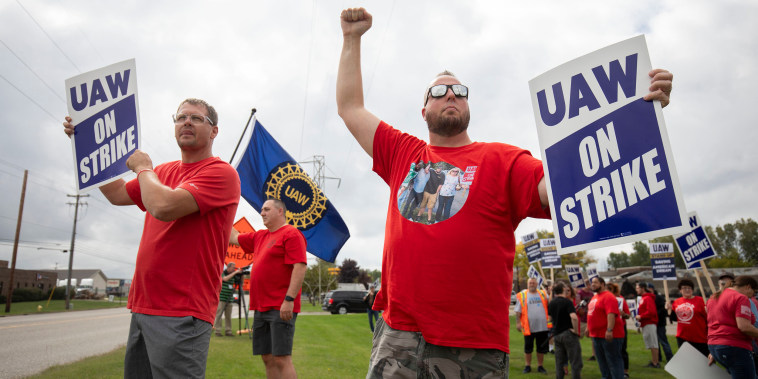The United Auto Workers union expanded its strike against Detroit’s Big Three for the second consecutive day as members at a major General Motors manufacturing plant walked off the job.
The union said 5,000 employees from the Arlington Assembly plant in Texas are now on strike. All of GM’s full-size internal combustion SUVs are worked on at that facility, including the Chevrolet Tahoe and Suburban, GMC Yukon and Yukon XL, and Cadillac Escalade and Escalade-V.
The move comes the same day General Motors reported its third-quarter results. The company said the strike has cost it around $800 million in pretax profits and it withdrew its 2023 profit forecast, but its quarterly adjusted earnings and revenue were better than Wall Street analysts had expected.
The expansion of the strike comes one day after 6,800 Stellantis employees walked off the job, shutting down manufacturing at a facility where Ram 1500 trucks are made.
In a statement, GM said it was ‘disappointed’ by the step.
“Last week, we provided a comprehensive offer to the UAW that increased the already substantial and historic offers we have made by approximately 25% in total value,” the company said.
It’s another escalation in the union’s strike against GM, Stellantis and Ford. The union previously ordered a walkout on Oct. 11, when it struck against Ford’s Kentucky Truck Plant.
Full-size SUVs and pickup trucks are some of the highest-priced and most profitable products that the Big Three make. They are also some of the most popular vehicles among U.S. consumers.
In the early weeks of the labor stoppage, the UAW had been calling on additional workers to go on strike once per week and was giving the automakers more notice about potential strikes. It also did not strike those truck and SUV plants initially.
The strike is now more than five weeks old, and the union appears to be moving at a faster pace to push the companies to complete a new contract.
Around 45,000 UAW members are now on strike out of a total of 146,000.
They’re seeking annual pay raises of more than 40% over a four-year contract, a shorter workweek, improved pensions for retirees, better health care, cost-of-living adjustments and an end to wage and benefit tiers.
The automakers have offered record contracts with pay increases of around 20%, as well as bonuses and other improved benefits.
The strike began on Sept. 15, after the contract between the union and the Big Three expired. It’s the first time the UAW has gone on strike against all three leading U.S. automakers at the same time.
